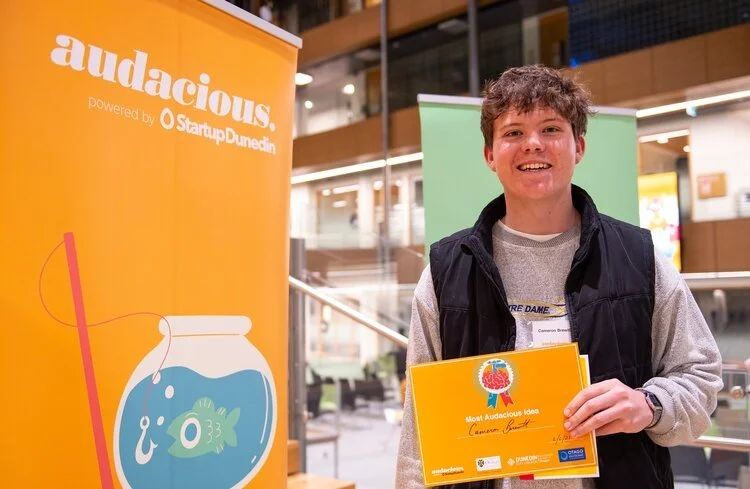Squirm: Feasibility of worm farms in student flats
Cameron with his prize for ‘most audacious idea’ at the 2021 Audacious awards.
Cameron Brewitt was a recipient of Food Waste Innovation’s seed funding grant for 2021. Cameron is completing a Bachelor of Commerce with a Marketing & Finance Major. His project ‘Squirm’ was the subject of his ‘Audacious’ business program project and of summer studentship with Food Waste Innovation. As a result, Cameron produced a ‘guide to worm farming in your student flat’. you can view his resource in our resource centre HERE.
Currently, food waste disposal measures are not great for those who are not interested in it, especially in Dunedin student flats and halls. There is little incentive to organise appropriate green waste and throwing food scraps in the red bin seems to be much easier, despite the adverse climate effects this produces. Worm farming may be one of the best ways to ethically dispose of most food, but the compost that is produced is only helpful to those with a home garden, so this is not undertaken in many areas.
“Over the summer I undertook a research project with Food Waste Innovation to trial a concept to incentivize a sustainable food disposal method for students by offering monetary rewards for worm farming. Students are spending their scarce income on landfill services to deal with their food waste which in turn harms the local environment. My plan was to encourage worm farming by purchasing the compost produced by the worms based on volume and quality. In this way, students are essentially getting paid to ethically dispose of their food waste.
I conducted a small scale trial involving 16 flats to see how students with no worm farming experience would engage with this concept. Although at first, I was apprehensive that this whole idea would fail, the results of this experience turned out to be very positive. All trialists reported that they found the experience personally rewarding and all would recommend a flat worm farm to other students. Despite having no prior worm farming experience, trialists reported the experience to be a low level of difficulty and quickly attained the required worm farming knowledge. Monetary rewards were also found to be a sufficient motivating factor for the students to feed their worm farm and avoid putting food waste in the rubbish.
All in all, I believe this trial was a success and I am optimistic for the possibility of implementing this concept on a widescale in North Dunedin. Thank you to Food Waste Innovation and Worms R Us for the support in this project. “ - Cameron Brewitt.
Watch Cameron’s presentation at our Student Symposium in March 2022 HERE.

